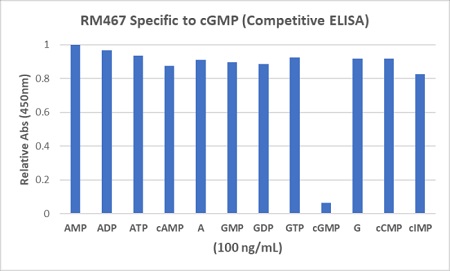
Competitive ELISA showing the specificity of anti-cGMP (RM467). The 96-well plate was coated with 1 ug/mL of Goat anti-rabbit IgG (50 microl/well). 0.05 microg/ml of anti-cGMP (RM467)(50 microl/well) was added and incubated. After wash and block, cGMP and other cyclic nucleotides or nucleoside phosphates (25 microl/well) were added along with 25 microl/well of 1/5,000 diluted HRP conjugated cGMP. TMB was used to develop the color after incubation and wash.
anti-cGMP, Rabbit Monoclonal (RM467)
REV-31-1359-00
ApplicationsELISA
Product group Antibodies
ReactivityAll Species
Overview
- SupplierRevMAb Biosciences
- Product Nameanti-cGMP, Rabbit Monoclonal (RM467)
- Delivery Days Customer10
- Antibody SpecificityRM467 reacts to cGMP (Cyclic Guanosine Monophosphate). No cross-reactivity with other cyclic nucleotide or nucleoside phosphate.
- ApplicationsELISA
- CertificationResearch Use Only
- ClonalityMonoclonal
- Clone IDRM467
- Concentration1 mg/ml
- HostRabbit
- IsotypeIgG
- Scientific DescriptionCyclic guanosine monophosphate (cGMP) serves as a second messenger in a manner similar to that observed with cAMP. Peptide hormones, such as the natriuretic factors, activate receptors that are associated with membrane-bound guanylate cyclase (GC). Receptor activation of GC leads to the conversion of GTP to cGMP. Nitric oxide (NO) also stimulates cGMP production by activating soluble GC, perhaps by binding to the heme moiety of the enzyme. Similar to cAMP, cGMP mediates most of its intracellular effects through the activation of specific cGMP dependent protein kinases (PKG). - Recombinant Antibody. RM467 reacts to cGMP (Cyclic Guanosine Monophosphate). No cross-reactivity with other cyclic nucleotide or nucleoside phosphate. Isotype: Rabbit IgG. Immunogen: KLH-conjugated cGMP. Applications: ELISA. Liquid. 50% Glycerol/PBS with 1% BSA and 0.09% sodium azide. Cyclic guanosine monophosphate (cGMP) serves as a second messenger in a manner similar to that observed with cAMP. Peptide hormones, such as the natriuretic factors, activate receptors that are associated with membrane-bound guanylate cyclase (GC). Receptor activation of GC leads to the conversion of GTP to cGMP. Nitric oxide (NO) also stimulates cGMP production by activating soluble GC, perhaps by binding to the heme moiety of the enzyme. Similar to cAMP, cGMP mediates most of its intracellular effects through the activation of specific cGMP dependent protein kinases (PKG).
- ReactivityAll Species
- Storage Instruction-20°C
- UNSPSC12352203
